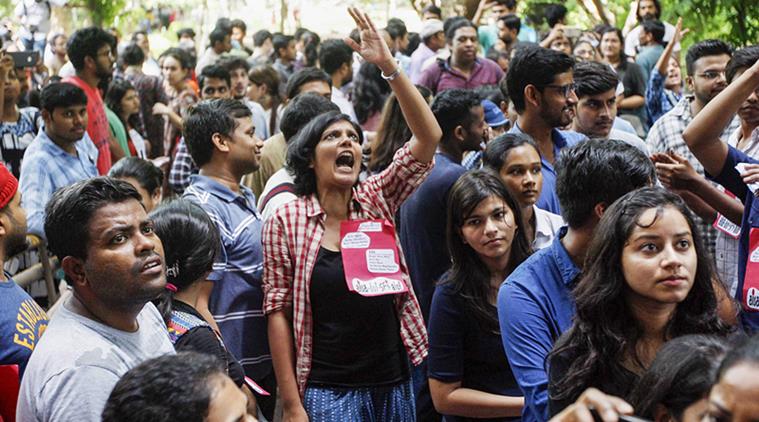 Jawaharlal Nehru University (JNU) students wait to place their votes during the students’ union polls. (PTI)
Jawaharlal Nehru University (JNU) students wait to place their votes during the students’ union polls. (PTI)
Friday’s elections to the Jawaharlal Nehru University Students’ Union (JNUSU) saw the highest voter turnout in recent years, with nearly 68% students coming out to exercise their mandate — a considerable leap from last year, when the figure stood at 58.7%.
Counting of votes began on Friday night, and is likely to go on till Saturday or Sunday, officials said. “A total of 5,185 of 7,644 students — or 67.8% — voted,” said Election Committee chairperson Himanshu Kulshrestha. Of the four voting centres, 1,764 votes were polled at the School of Languages, which has 2,531 students. At the School of International Studies, 879 out of 1,341 students voted; at the School of Social Sciences, it was 1,325 out of 2,163; and at the School of Environmental Sciences, 1,217 out of 1,609 students cast their vote.
The jump in votes appears to be the most considerable in the School of Languages, which is the largest and is considered a stronghold both by the Left-wing AlSA and the Right-leaning ABVP. On Friday, the campus resounded with slogans and drum beats as candidates and organisations made a last ditch effort to woo voters. New to JNU’s culture were the umbrellas with pamphlets stuck on them, used both by ABVP and NSUI. Supporters of Jayant Kumar, fighting for the post of president from the Chhatra Rashtriya Janata Dal, also carried balloons with his name written on it.
There was also a fair share of “anti-campaigning”. With ‘Reject Johri, Reject ABVP’ posters in their hands, several students sought to link the student outfit to JNU professor Atul Johri, who has been accused of sexual harassment by several students.
For most students, the issue of compulsory attendance seemed to be most important. “I’m a PhD student and it’s not possible for me to mark attendance every day, so I’ve voted for people I think will fight for it most effectively. I’ve thoroughly considered who has been working on the ground,” said a student from the Centre for International Politics, Organisation and Disarmament.
Deepanita Ghosh from the Centre for English studies said, “As students, we have been facing issues such as fund cuts, imposition of compulsory attendance… The presidential debate is very helpful, as it is easy to know the candidates’ agenda and manifesto.”
Anwesh Mukherjee from the Centre for Economic Studies & Planning said he had taken note of the “deliberate attempt to disregard the long-term democratic norms of JNU” while going out to vote. “We need someone to stand up to the administration,” he said.